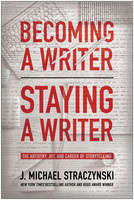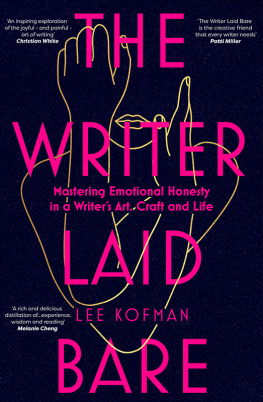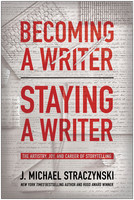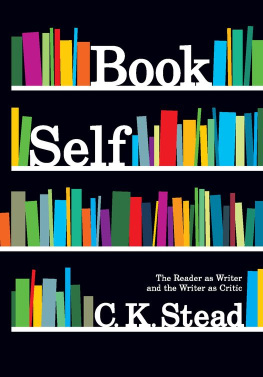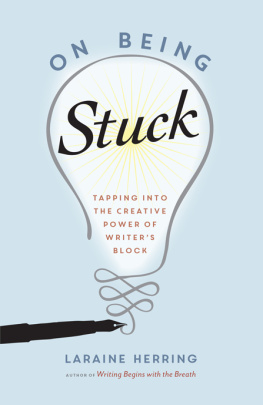Praise for Writing from the Inside Out
"Dennis Palumbo's wise, compassionate and funny Writing from the Inside Out tells us something that remains a secret in the writing business: Find a subject as a writer that holds your attention so strongly that you forget yourself-and you're already in the money."
-Aram Saroyan, poet and novelist
"Finally, a book that will not only help us become better writers, but better human beings. In Writing from the Inside Out, Dennis Palumbo speaks with a wise and authentic voice about the trials and joys of both the writing experience and life itself Filled with humorous stories and practical, compassionate advice, he feels like the best friend every writer wants and needs. Both a provocative and completely comforting read."
-Earlene Fowler, Agatha-Award-winning author of Seven Sisters and Mariner's Compass
"Eminently practical advice on how to untangle the mysterious vines of the creative process and successfully continue the journey, and it flashes with that rarest of things-wisdom."
-Richard Setlowe, author, The Sexual Occupation of Japan and The Black Sea
"In Writing from the Inside Out, Dennis Palumbo talks to you, befriends you, gains your trust and then, because he is so convincing and effective, teaches his readers how to capture and become comfortable with the writer's life-the pain, joy, struggle and reward. He is the perfect teacher and companion for a writer in need of support and inspiration."
-Lee Gutkind, editor, Creative Nonfiction, and author, Many Sleepless Nights
Writing from the Inside Out
Transforming Your Psychological Blocks
to Release the Writer Within
Dennis Palumbo


For
Lynne and Daniel,
with love


Contents
Part One THE WRITING LIFE
Part Two YOU ARE ENOUGH
Part Three GRIST FOR THE MILL
Part Four THE REAL WORLD
Part Five PAGE FRIGHT
Part Six THE REAL WORLD, PART II
Part Seven HANGING ON
Part Eight DISPATCHES FROM THE FRONT
Foreword
Be warned:
This is not a how-to book. It offers nary a rule, formula, nor recipe that will allow you to turn out a best-selling novel or a fabulous, million-dollar screenplay. Just as well. In the end, most million-dollar screenplays turn out to be threemillion-dollar screenplays, once the inevitable rewriting frenzy begins and other hands are called in to rescue the formerly fabulous million-dollar screenplay.
It is not that handy-dandy kind of book and that is just as well. Never before have so many of the smugly expert advised so many of the seemingly inexpert on how to write successfully and on how to become rich and anonymous (screen and television writers can reap sizeable financial rewards, but they rarely get anything like famous). The pages that He ahead provide far more valuable insights and practical tools for the working and/or would-be writer. Instead of a how-to, what Dennis Palumbo has written is a how-come hook.
A veteran of the writing wars himself, Palumbo brings fresh insight into the whys and wherefores of the numerous dilemmas each writer faces, or, at times, refuses to admit. He encourages the wanna-bes and the already-ares to confront their concerns, to recognize what lies at the heart of them, to ultimately turn their demons into constructive, liberating collaborators.
The dreaded writer's block? Dennis Palumbo's take on the subject is as novel as it has proved successful for a good number of those who have had the good sense to seek his counseling. What he offers is not a one-size-fits-all cure, but rather an understanding of the sort of writer's speed bump that can sometimes seem the size of a mountain. By leading the sufferer to the underlying truth of his or her particular form of this creative cramp, Palumbo lays the groundwork for a way not around the problem, but one that goes right straight through it.
Procrastination? Doubt? Fear of failure? Loneliness? You name it; Palumbo's been there, done those-in his own writing career and in his artful advice to others. (Even in the act of writing this brief curtain-raiser, I have (1) procrastinated finishing it until the very last second of my deadline, (2) doubted that I was the best choice for this assignment, (3) been dreading how awful it would be to fail, not writing terribly well about this terribly well-written book, and (4) thought how lonely it was today-as it is every working day-to sit down in my solitary room without one person there to say "good morning" to me.)
For years, I was convinced that I could not write alone, that I needed a partner or to work as a member of a staff, surrounded by multiple partners. I had no faith in my ability to produce material on my own. What this wise, accessible volume makes crystal clear is that no one writes alone, that our superficial appearance merely represents the outer limits of the complex, teeming population that resides in each of us: the brave, the fearful, the confident, the unsure-the braggart worrier who sits not beside but within anyone with the temerity to pan for the gold that lies hidden in the blank page or the monitor.
Early on, Palumbo promotes the concept of the Buddy System, the idea that every writer needs someone who has gone through what you're going through; someone who is happy to serve as an ear, a shoulder, a kindred spirit. Someone who gets it: the work you're doing, the town or medium in which or for whom you're doing it, someone who has been to the same meetings, been given the same notes by executives, stars, directors, editors, whoever (probably word for word the very same notes you were given by someone else about a totally different piece of work). Most importantly, you need to get someone who gets you. Dennis Palumbo's Writing from the Inside Out, with Dennis serving as a thoroughly knowledgeable, compassionate companion, makes him not only a useful friend but one who is userfriendly as well. He is the buddy every writer dreams aboutthat is, if writer's block isn't keeping you up all night.
Larry Gelbart
Acknowledgments
The author would like to thank the following people, without whose help and encouragement this book could not have been written:
Lisa Chambers and Richard Stayton, editors of Written By, the magazine of the Writers Guild of America, in which much of this material first appeared;


